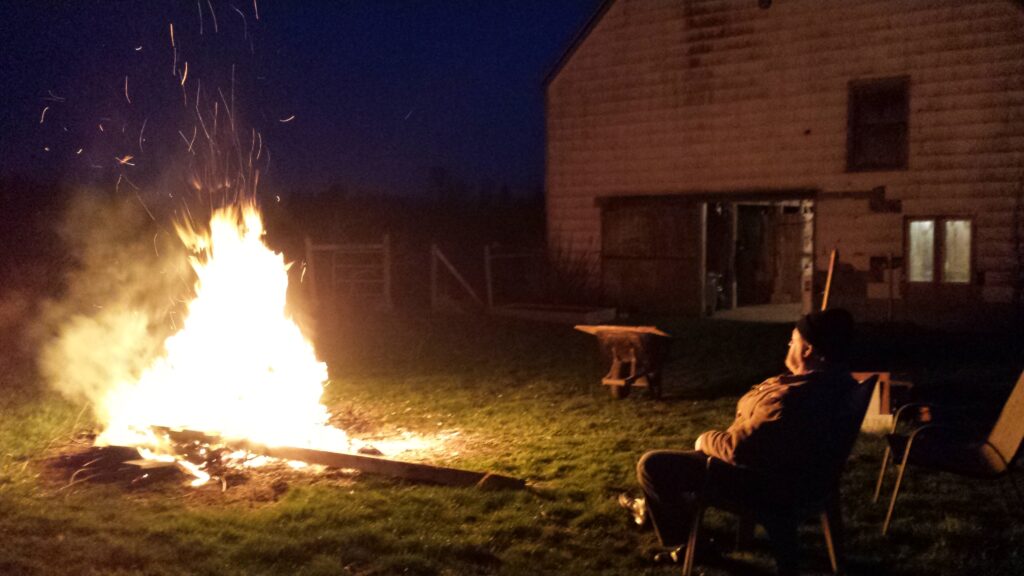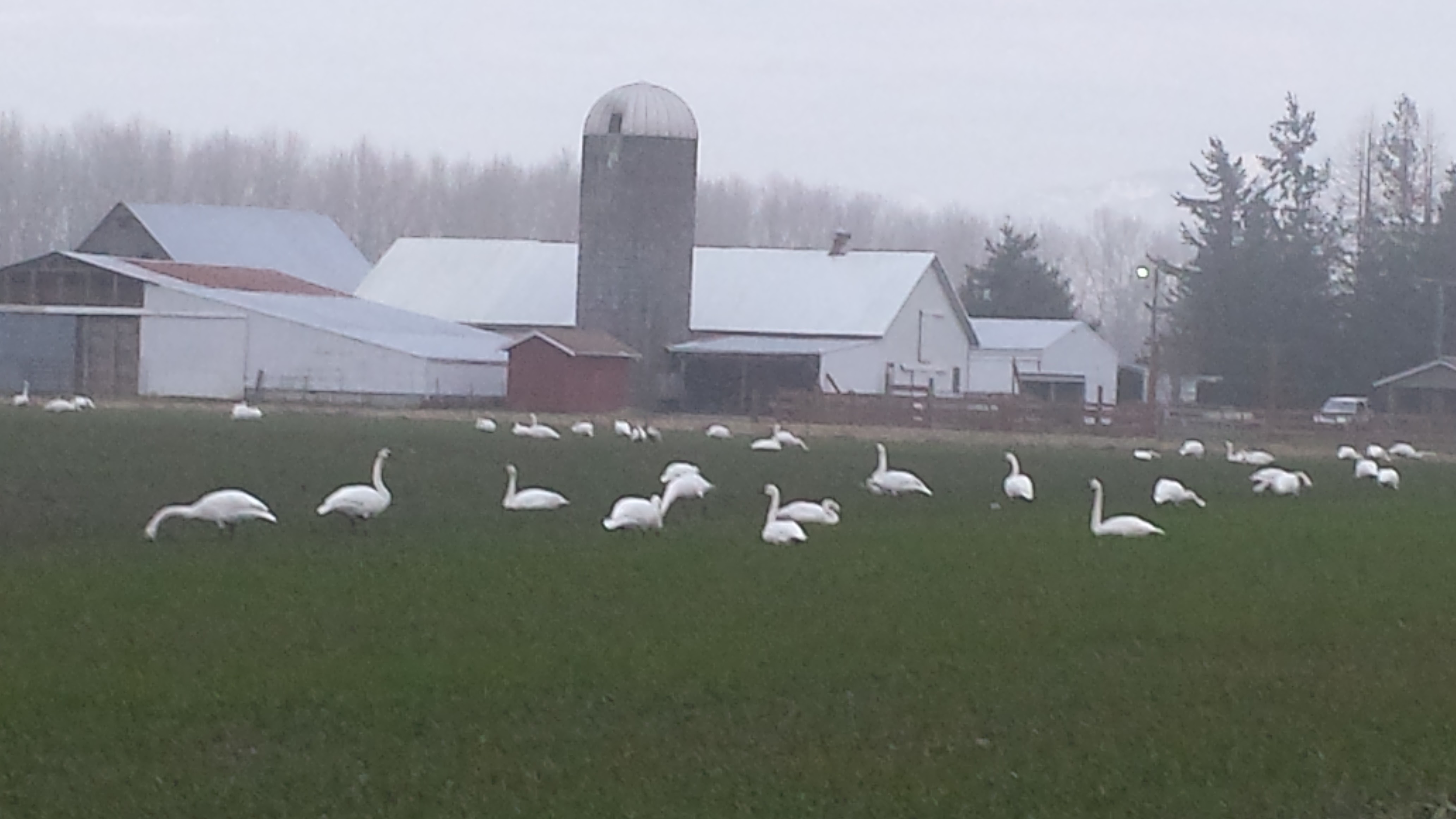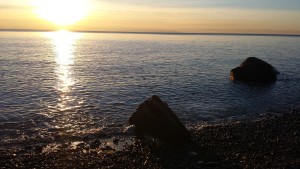The voice of my father. This is the voice of my father.
There is no distance in space now between us despite the weight of the receiver in my hand, the recognition of three thousand miles. His voice is sitting right inside me, the intensity wiping away everything else. There is no wall of separation. The wind of this energy is passing through us both.
“Yes, you’re my daughter! It’s you! We’ve been waiting, hoping for this call for years. But we didn’t really dare think you would want to contact us; would find us. It was too much to ask.”
“Tell me about yourself? Where do you live?” he asks.
“I live in Vancouver, Washington…”
Before I can go on he says,
“Oh, yes! That’s marvelous. Washington State! Marvelous! Are you alright?”
“But of course you are! I can tell. Wait, let me tell you about you!”
“You’re tall. You’re blond with brown eyes. You’re beautiful and intelligent.”
Relishing this paternal embrace in a way I had never anticipated, I hear myself saying, “Yes! Yes, that’s right”, inwardly blushing at the “beautiful,” almost wanting to stop him.
“You were born at Lenox Hill Hospital. Your mother—her name is Toni—just like you — I can’t believe it — held you for three days. This didn’t usually happen if the baby was being given up, but the nursery was being painted. She was heartbroken to give you up.”
“How did your parents keep that name? How did they know? How did they have the generosity?” are his next questions.
“I don’t know. My mother said that it was just something she just knew, something she knew was essential to keep. She insisted, even though my father thought she was crazy to keep it. He bowed to her.”
“What an incredible act of intuition, of pure resonance! Your mother, Toni, gave you the name as a tiny thumbprint of her love for you. She never expected your adoptive parents would keep it. Never. That was unthinkable.”
My God, I think, they’re married. They’re still together. These are my parents, together.
“And you have four siblings, three brothers and a sister. They all know you exist and they’ve been worried about you ever since they found out you existed. Your mother told them on your eighteenth birthday since we knew you were old enough to have access to records and could try to contact us. We talk about you. They’ve worried that you were out there and we didn’t know if you were alright.”
A molten volcano has been smoldering in my chest. Now I feel it begin to reach my throat, my eyes, the top of my head. I had never dared to imagine brothers, sisters, some kind of genetic compatriots.
“Let me tell a little more about who you are.”
He is rushing ahead, as if he, too, has thought out all he would tell me if he had the chance, as if the connection to my mother and history must be established immediately. We’re both a bit giddy with the silliness of this rampant story.
“Your mother’s family is pure WASP. She’s a Robinson. They go back to the Mayflower, for God’s sake. Your direct ancestor was Cotton Mather, which may or may not be a good thing!”
Here began the surreal. I already had had connection to a grandmother who was Polish, warm and fat and smelling of coal and butter from the kitchen–a peasant, whose lap I could sit on in a rocking chair. This new family seemed more foreign to my experience than if I were told they were Sami with a herd of reindeer still grazing back in the old country.
“And then there were the Knoxes of Knox Hats. You go back to Charles Knox who came over from Ireland in the early 1800s and started his own hat factory. They started with beaver hats and then came up with the stove pipe hats that became all the rage in the nineteenth century. They made a fortune. Abraham Lincoln wore Knox hats! Their daughter married Hannibal Robinson who went off to the wilderness selling hats. And then somewhere along the way around Civil War times there was American Flag Knox. You’re just swimming in WASP-y history. You could even become a member of the DAR! My God! I hope you don’t mind!”
Somewhere along the way I had begun to laugh. Now we both were laughing. The absurdity of it all. His voice, deep and rich with a foundation of unwavering confidence, left no room for disbelief, just overwhelming joy at having found this man of such fluent intelligence, such wit, such generosity of spirit–qualities not unlike those of the father who’d raised me. It was a moment splitting with things to come, like a ripe seed pod with seeds ready to fly. But at that moment, the laughter gave me more of a sense of freedom, the headiness of delight. My senses were alive.
“And then there was my family,” he is continuing.
“Somehow, none of the kids look anything like them, thank God! You probably don’t either. They were Eastern European Jews who immigrated to this country in the early 20th century. They lived in New York and my father managed to buy a small grocery store he ran till his death. My aunt (your great aunt) immigrated to Israel at the end of the war. She ended up starting the first Kibbutz there — Kibbutz Don. She was quite a powerful character, with a face like a catcher’s mitt. The kids have all been to Israel at different times.”
Here was the upside down history. My adoptive mother’s lineage—Eastern European Jews coming to Brooklyn at the beginning of the twentieth century—setting up small businesses, getting through the Great Depression—this was also in my paternal genes, somehow hidden. What a funny man this was, de-ordering all I knew.
There was a pause just long enough for me to think of what else needed to be said. “You have two grandchildren.” I say.
“Oh, God! Really? Tell me about them!”
“There’s a girl aged four and a boy a year old.”
“You’re kidding! We have two granddaughters about the same ages! Your brother Evan’s girls. The youngest brother. He dotes on them. What about yours? Are they healthy? I would imagine you’re a wonderful parent.”
I told him a bit about each – my daughter’s pre-school, my son’s yellow curling hair. He asked about a marriage and I told him, yes. We talked a bit about my husband.
He proceeded to tell me a little about each of my siblings, three brothers and the youngest, a sister. Brothers. A little sister.
“They’ll all want to meet you as soon as possible. You will love them all. They are all unique, sharply smart and sensitive in their own ways. I’m sure you’ll find you have things in common. ”
It begins to dawn on me that I am actually being invited to become part of this family. Ah!
I ask, only partially in jest, “Will it bother David as the eldest that he suddenly has an older sibling?”
“God no! He’ll be so relieved to give up the position. It’s not an easy one! He can tell you.”
“It’s been a difficult stretch for your mother. This will cheer her no end. You don’t know what a wonderful thing you’ve done by calling.” Again, I blush and stammer something about how it was a force rather than a matter of choice.
He continues, more soberly. “You don’t know how long I’ve been trying to make up for your loss to your mother. All this time. So many ways.” There is a short pause on the line. A breath.
We began to discuss how we would be able to meet. He quickly insisted he would be the one to fly out to see me first, as the forerunner, as soon as he could arrange it.
“It will give your mother time to absorb things. I’ll be able to tell her what I experience and she will be able to absorb it first through me. Seeing you will have such an enormous impact for her.”
“Likewise,” I say.
This was the man I had sung to as a child, whose image I had created out of bits of story and intuition–whose love I had conjured up for myself. It seemed in some way he was this man and not this man. There certainly was the experience of a powerful love, the importance of family.
I recognized, as my mind began traveling back from this intensity of moment to the practicalities of life, of children to be fed and retrieved, I had always shied from imagining my mother as deeply. Now I had a mother in whom I might see something of myself. What was that?
As we gathered ourselves, made a plan for Toni to contact me later that day and, as my son began to cry in his bed where he was waking, I breathed in the impact, gathering my sense of self into my body, settling my mind, getting ready to move through the rest of the day. Something of great moment had happened. Something that was not only a shift in my own life, but a bigger shift. We said goodbye, he adding,
“You don’t know how good it is to hear your voice. This changes everything.”
I wondered and then I thought, “It may. Yes, it may.”



